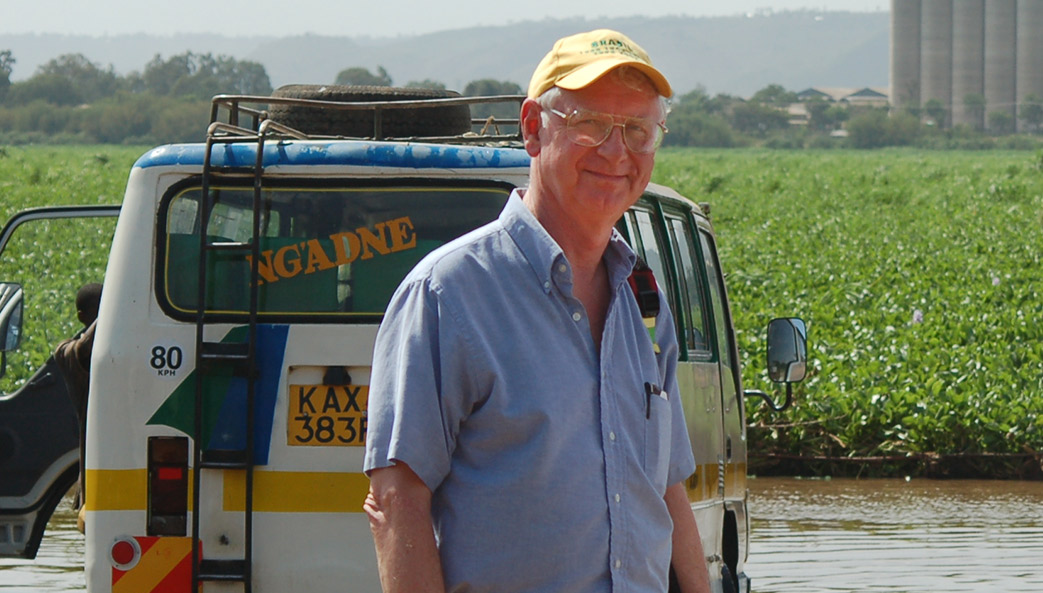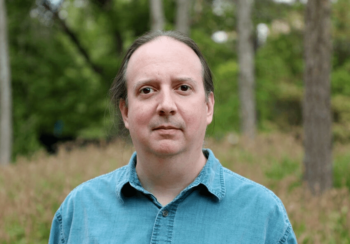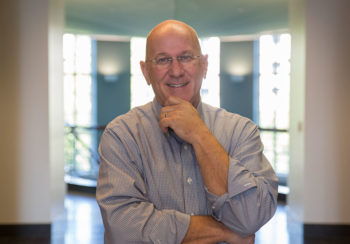Update: Dan Colley will retire from UGA effective June 30, 2020, and become professor emeritus. The Global Schistosomiasis Alliance penned this tribute to Colley upon his retirement.
One day Daniel Colley raised his hand to volunteer, setting in motion five decades of scientific adventures. It was 1969, and Colley’s postdoctoral adviser, Byron Waksman, a renowned immunologist at Yale University School of Medicine, had stepped into the laboratory and asked if anyone wanted to go to Brazil.
“I have no idea why my hand shot up,” says Colley. “I didn’t know anything about Brazil. My wife and I didn’t even have passports. I asked Byron about the nature of the research, and he said, ‘Schistosomiasis.’ My response was, ‘What’s that?’”
Colley, today a UGA immunologist and Fellow of the American Association for the Advancement of Science, became fascinated by schistosomiasis, a parasitic worm infection plaguing poverty-stricken communities in sub-Saharan Africa and around the world. Globally more than 250 million people are infected via contact with water that carries the parasites.
The waterborne worms penetrate human skin and take up residence in blood vessels. About 5 to 10 percent of infections progress to life-threatening disease over decades. But most people experience more subtle symptoms such as fatigue, anemia, wasting, malnutrition and impaired cognitive development.
“Children playing in the water are picking up these chronic parasitic infections,” he says, “so they are sick and don’t do as well in school. If kids don’t receive what they need to develop early in life, it can become a lifelong disability.”

After his Brazil sojourn, Colley arrived at Vanderbilt University in 1971, setting up a lab and beginning his career-long effort to understand the immunological paradox of schistosomiasis (or “schisto,” in the vernacular).
“The more I learned about schisto, the more interesting it became,” says Colley, who tweets as @SchistoKid. “It has a bizarre life cycle. Here’s a worm that can live inside your blood vessels for up to 40 years, though more typically it lasts for five to 10 years. Why doesn’t your immune system get rid of this creature sooner? That was a very intriguing question.”
In infected human blood vessels, the female worms produce eggs that the male fertilizes. Many of the eggs escape the human body in urine or feces. When people urinate or defecate in or near fresh water, the eggs can infect freshwater snails, where the parasite develops and rapidly multiplies. When worms re-enter fresh water, they can find human victims.
Meanwhile, the body’s remaining worm eggs are swept by the bloodstream into the gut wall and the liver or bladder, where they become lodged. The immune system fights these egg intruders with a delicate, two-pronged effort: First, masses of cells called granulomas wall off the eggs, isolating them from surrounding tissue and reducing disease. But the immune system must also regulate granuloma growth. For most people, this regulatory response keeps granulomas relatively small, but some grow over decades, eventually causing fibrosis and blocking blood flow through the liver, causing internal bleeding.
“Schisto is a very complex puzzle for an immunologist,” Colley says. “If you fail to have the initial immune response against the egg, you die. But if you fail to regulate this immune response against the egg over time, you die. How our immune system has co-evolved with schisto is fascinating to me, and I still haven’t figured out how it’s done.”
In 1992, he joined the Centers for Disease Control and Prevention and a year later was promoted to director of its Division of Parasitic Diseases. “I learned about a lot of other parasitic diseases. It was an incredibly broadening experience that became useful in my later work at UGA. From my colleagues, I gained knowledge in epidemiology—the incidence and prevalence of diseases and detecting the sources and causes of epidemics.”
He arrived at UGA in 2001 as professor of microbiology and director of the Center for Tropical and Emerging Global Diseases, created only three years before. “UGA started the center and took risks by investing in it,” he says. “Now it’s globally famous for its work in parasitic diseases and has 23 principal investigators.”
During the past decade, Colley has been director of UGA’s Schistosomiasis Consortium for Operational Research and Evaluation (SCORE), a program supported by the Bill & Melinda Gates Foundation. SCORE scientists study strategies used in eight sub-Saharan African countries to control and eventually eliminate schistosomiasis. Today, most sub-Saharan African governments collaborate with the World Health Organization and a pharmaceutical company to provide a free drug, praziquantel, that treats existing infections and can significantly reduce new cases.
“SCORE has shown that mass interventions with praziquantel do work, and they are best done every year,” he says. SCORE researchers also helped develop a more rapid and precise diagnostic test for schistosomiasis, discovering many more cases in children than previously thought.
“The main message I’ve learned in my career is that diseases such as schisto are diseases of poverty,” he says. “Poverty contributes to these diseases, and poverty is also the result of them. If you are a stunted kid, and you have anemia, and your cognitive development is not great because of a parasite, it’s harder to succeed.
“People are the same everywhere—they all want a better life, and in some places, that’s not happening. Fighting these infections is an important part of making lives better.”






